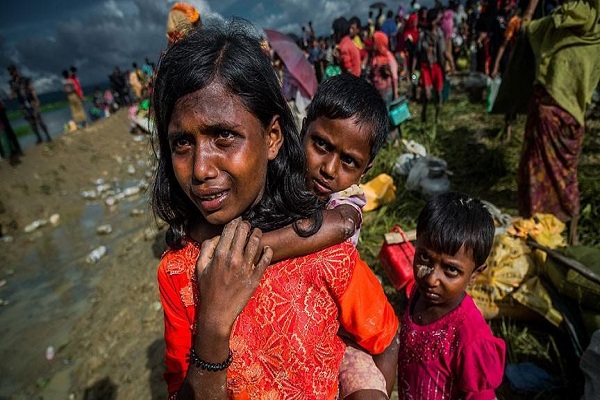Anniversary of Rohingya Exodus: No End in Sight

Although the crackdown began after 12 Myanmar security personnel were killed allegedly by the Arakan Rohingya Salvation Army (ARSA), there have been credible reports that the preparations to systemically eradicate the Rohingyas from Rakhine began long before the incident involving ARSA. Many believe the incident was just an excuse to launch a brutal military campaign against unarmed and innocent civilians.
The then United Nations high commissioner for human rights described the Myanmar military campaign as a textbook example of ethnic cleansing. Later, many individuals and reports confirmed that the Myanmar military committed crimes against humanity, including genocide.
The barbaric actions of Myanmar continued for several months and forced about 740,000 Rohingyas, which is nearly the population of Bhutan, to cross the border into Bangladesh’s Cox’s Bazar to save their lives.
According to numerous reports, including that of the UN, there are no war crimes that the Myanmar military did not commit. Mass killing, gang rape, the killing of babies, burning of people alive and burning of mosques, holy books, and homes are some of the crimes committed in Rakhine during the military campaign.
With the arrival of the about 740,000 Rohingyas, Bangladesh was faced with one of the gravest crises in its history. Despite its limited resources, Bangladesh gave the refugees shelter and security. The arrivals after August 25, 2017, are in addition to 80,000 Rohingyas who took shelter in 2016, and nearly 300,000 who have been living in Bangladesh for decades.
Meanwhile, in the past two years, the international community has confined its activities to talking, rather than action to solve this protracted crisis and hold the perpetrators to account. The host community has suffered and Bangladesh diplomacy has been inefficient, as a situation for the people to hope for a breakthrough in terms of repatriating the displaced Rohingyas is yet to be created.
The Rohingya settlements in Cox’s Bazar have become one of the most frequently visited places by international dignitaries. Past visitors include heads of states and government officials, the entire UN Security Council, the UN secretary general, and members of royal families.
Visiting dignitaries assured that they would provide aid for the refugees, and they did so to a large extent. However, they shied away from taking any visible action that might compel Myanmar to take its own people back. The only move worth mentioning is the decision of the International Criminal Court on its jurisdiction to look into the enforced deportation of hundreds of Rohingyas by Myanmar.
The Rohingya issue was discussed in many international forums, including the UN Security Council, UN General Assembly, and UN Human Rights Council, and many reports were published that held Myanmar responsible for many heinous crimes. The General Assembly and Human Rights Council also passed resolutions condemning the atrocities. However, the resolutions are non-binding.
It has become a routine question of many as to why the global body, especially the UN Security Council, is not acting despite the presence of so much compelling evidence.
The answer lies with the Security Council, whose resolutions are binding on countries. The Security Council does not act because China and Russia, two veto-yielding permanent members, are staunch allies of Myanmar. The other permanent members – the United States, United Kingdom and France – are for a resolution, but they are not pressing for a Security Council resolution due to the veto threat of China and Russia, who regard the Rohingya issue as a bilateral one between Bangladesh and Myanmar.
The other influential countries appear to be not interested, at least for now, in going beyond imposing some targeted sanctions that are obviously not working.
It is anybody’s guess as to when the international community will think that time has come to act.
As far as Bangladesh diplomacy is concerned, many experts observed that it has been inefficient as well as inadequate over the past two years.
Prior to the August 25 crackdown, the government had reported that there would be large scale military operations in Rakhine, but the report did not work as it should have. Ahead of the crackdown, Bangladesh could have asked the UN and influential countries to rein in Myanmar and sensitize the international media about the brewing issue, which could have minimized the devastation at the least.
After the crackdown, Bangladesh diplomacy did not see many successes in regards to the repatriation of the Rohingyas. Despite significant political and financial engagements with Beijing, Moscow and Delhi, Dhaka could not prove itself more important to them than Naypyitaw. It is the belief of many that if these three countries support Bangladesh, the Rohingya crisis will be solved quickly.
All but a few wishful thinkers knew that it would take a long time for the crisis to end. However, no one thought that it would take so long for the repatriation to even begin, considering the existence of an agreement between Bangladesh and Myanmar.
Now, after two botched attempts to begin repatriation and the unwillingness of Myanmar to honor the agreement, even the most optimistic Bangladeshi official cannot think of predicting when the repatriation will begin.
By Humayun Kabir Bhuiyan
Source: The Dhaka Tribune



